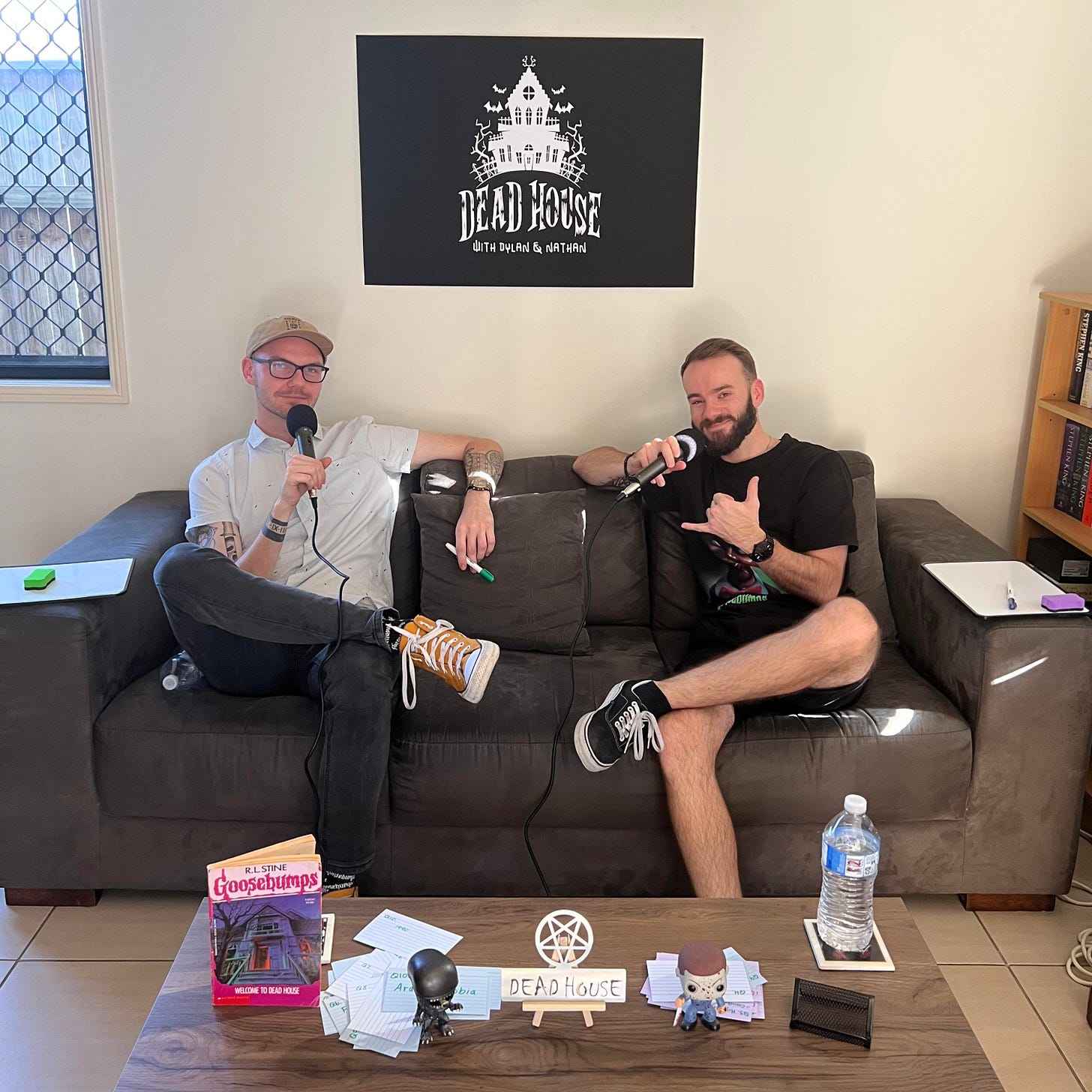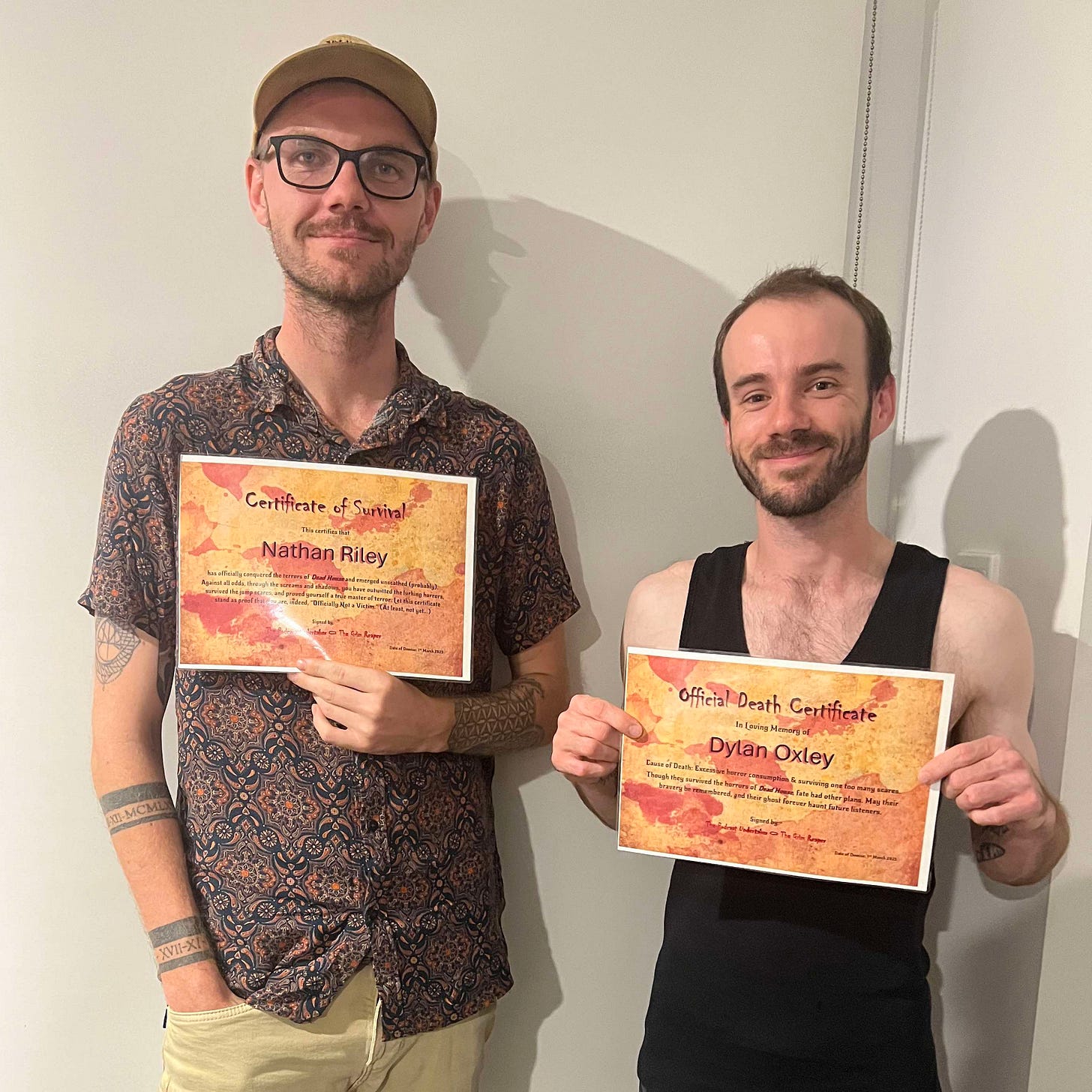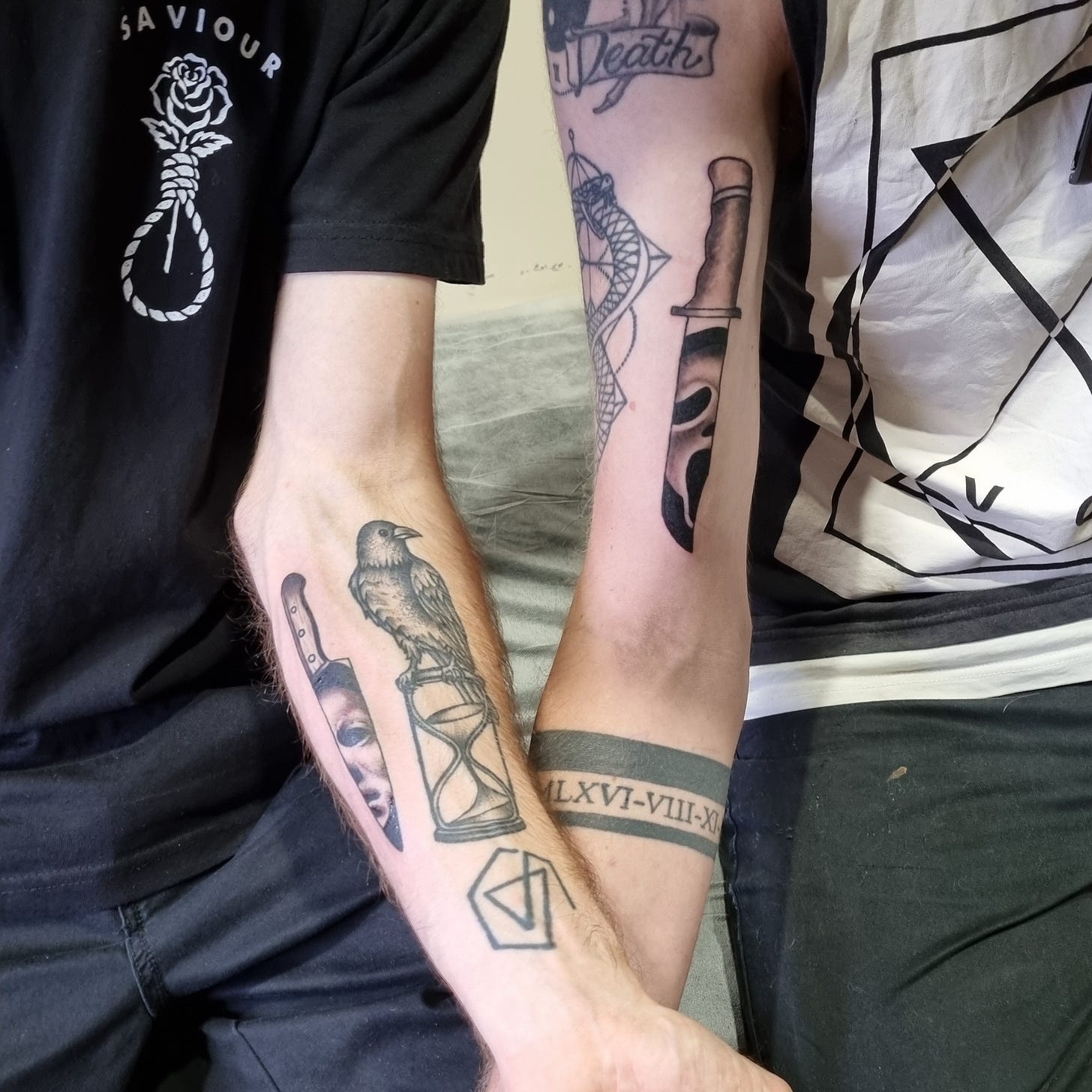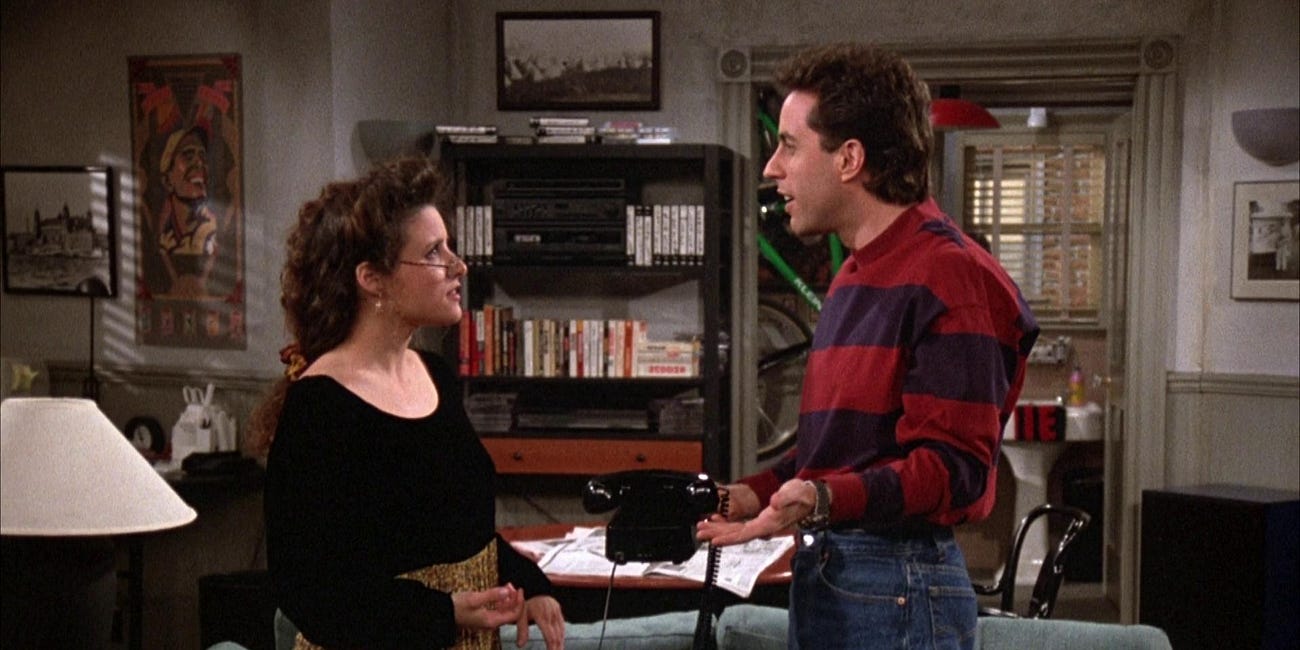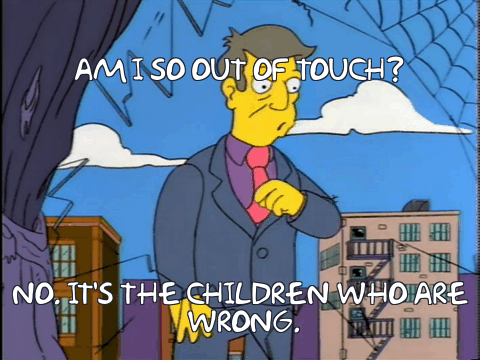What I Learned from Having a Podcast
I reflect on 100 episodes of Dead House as it comes to an end
Welcome to your Wednesday Fix at The Drip Tray: a weekly dose of inspiration and reflection to keep you focused, like a philosophical espresso.
I had never even listened to a podcast before when I got the idea to start my own. It came after my friend Nathan and I watched Friday the 13th (1980) together one Friday the 13th for a laugh. When we were discussing the film the next morning, scrutinising the ridiculous technique and appreciating the gory kills, I realised two things. One, we both love horror films. And two, we have a lot to say about them.
After giving up on an album review channel and burning myself out writing music features for publications, I decided that I needed a new creative outlet for my passions. A podcast seemed like the most viable medium since we could keep it to an audio format and I already had most of the recording gear. So, after convincing Nathan to try it, we planned our episode structure and release schedule then set to work in early 2023.
We chose the name Dead House because we both grew up reading Goosebumps books and the very first, as well as a personal favourite of mine, was Welcome to Dead House. In the early days, we would pick scary movies that at least one of us had seen and liked then review it beat by beat in my parents’ dining room. As the show developed, it shifted more towards a general discussion of the films and even incorporated listener engagement.
So, what did I learn from co-hosting a podcast for two years?
Something will eventually go wrong
Every filmmaker, musician and digital artist believes in Murphy’s Law, so you’ve got to prepare for the worst and hope for the best when working with technology. Always save the project BEFORE you start recording. When we recorded our episode on The Shining (1980), my laptop shut down halfway through because I forgot to turn the power on at the outlet. I know this is human error, but still. Dot your I’s and cross your T’s!
It’s also better to record at a slightly lower level than to have the volume too high. You can always bump it up in the mix, but you can’t do much with a distorted take. Take into account the vocal dynamic of a conversation and test the levels of any guests before they jump on – especially if you’re using two different types of microphones. We used two dynamic mics with a condenser mic once and trying to remove the bleed was a nightmare.
Consistency and convenience is key
We used to record on Sundays until it became an inconvenience to my parents, so we began recording at Nathan’s on Monday nights instead. It was a more controlled environment, or so we thought. Frustratingly, his neighbour would begin mowing just as we started rolling every week without fail until one day he stopped, never to be heard from by our listeners again. I’d recommend creating a designated space and acoustically treating it for consistency.
It also helped to have a digital planner with shared access that each of us could edit remotely. We used Google Calendar to plan episodes a month in advance and Google Docs to shortlist any movies that we wanted to cover. Sometimes we had conflicting schedules and would have to record two episodes in one week, so I’d suggest having at least one in the bank at all times in case of illness, holiday or some other unavailability.
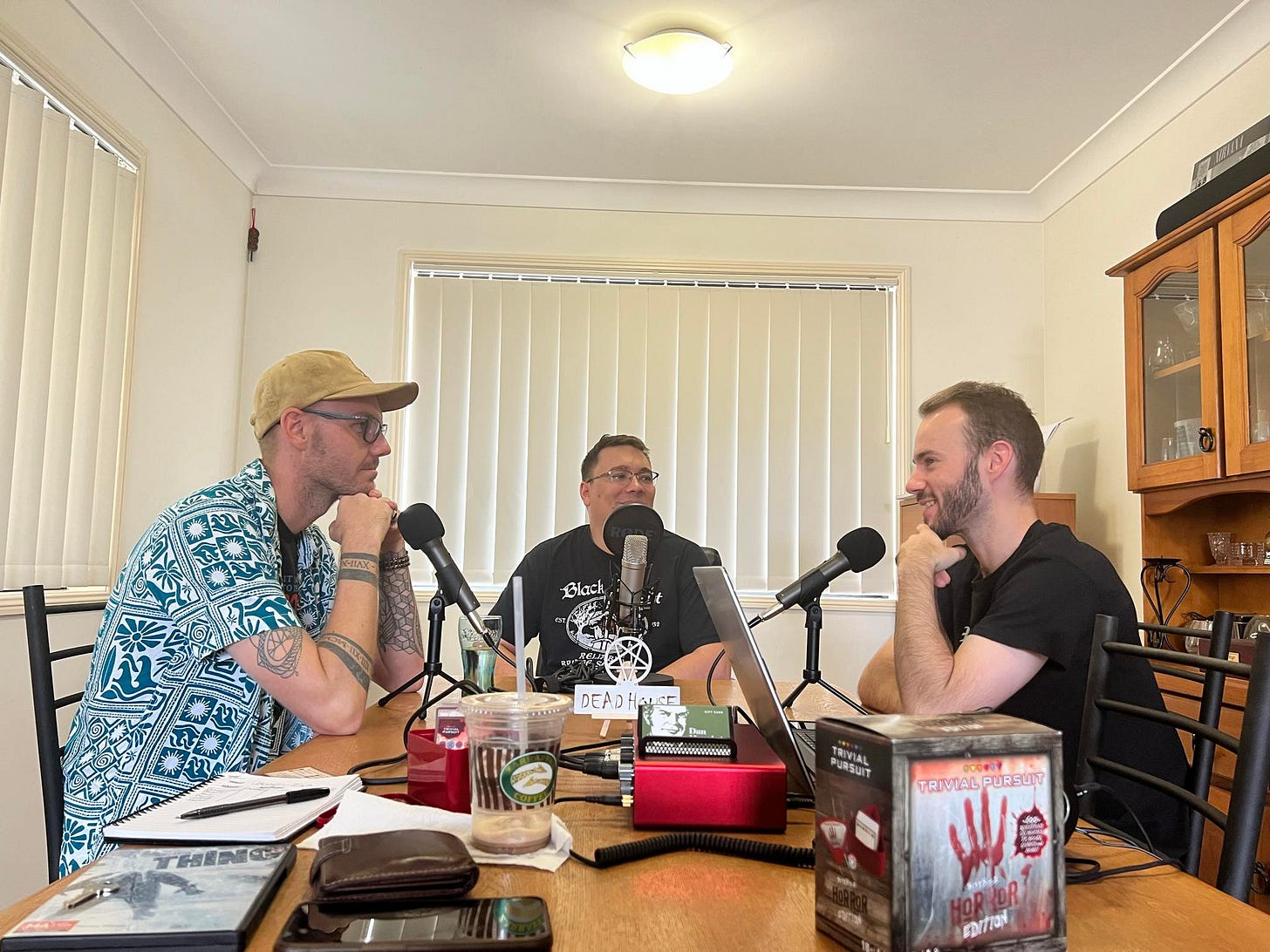
Talk about what you know
It’s important to be authentic, both as a personality and a presenter. We introduced ourselves in the first episode and divulged each of our top five favourite scary movies in the second before we got into critical analyses. Neither of us have been to film school or know anybody in the industry, but we were true to ourselves from the beginning. Maybe that’s why it resonated with people, because we were coming at it as audience members.
In saying that, not having a producer to fact-check us proved tricky at times. There were plenty of instances where I had to cut something that one of us said because it was incorrect or too much of a generalisation. I eventually got most of my research from reliable sources like The Numbers or interviews in the special features. Of course, we’re susceptible to confirmation bias, but it’s also more genuine when the opinions are our own.
Notice what works and what doesn’t
We used to release a new episode every Friday at 5pm because I had read that was the prime time for maximum engagement. After consulting the analytics, it turned out that most of our listeners streamed them early in the workweek, so we started releasing at midnight on Monday instead.
Another misstep was creating an email address for listeners to send feedback to that never got used. We later created a Facebook group and asked a weekly question relating to the film then read the answers in the next recording, which was far more successful.
The analytics also revealed that certain types of episodes weren’t performing as well as others, so we adjusted our shortlist accordingly. In the end, we just did whatever we wanted for the fun of it and the boost in morale had the same effect on the numbers.
Practice makes you gradually better
It probably took around 30 episodes for us to find our feet – and we stopped at 100. The most valuable takeaway was developing my conversational skills. I learned to be more patient and understanding, which has also made me a better interviewer. We didn’t speak over each other or criticise their opinions as much by the end of it. Nathan helped me consider different perspectives and our various interpretations made for interesting discourse.
Editing my own voice for a couple hours a week made me a more thoughtful speaker. I realised how often I um and ah when thinking of the next thing to say instead of simply pausing or not saying anything at all. This improved my enunciation and I was able to better articulate my points in future episodes. Also, the commitment of showing up and doing the work even when we didn’t feel like it kept us accountable and productive.
Learning leads to appreciation
Lastly, I came to expand my knowledge of horror cinema and appreciate the immense effort that goes into making a film. From researching the cast and crew, budget and box office, production and technique of more than 130 movies, I’ve learned a whole lot about the artform and the industry. I was already a big horror fan, but now I’m obsessed with the craft.
We are also both grateful for having a reason to finally watch a lot of the classics that we probably wouldn’t have if not for the pod. It’s also enabled us to spread awareness of some underrated newbies that our listeners may not have otherwise heard of. For example, I showed Nathan The Wicker Man (1973) and he showed me Smile (2022).
Running a podcast is hard work, let alone while working full-time and volunteering in between. It was a modest venture – we only reached a loyal few each week, and bless you all! – but we always did it for us, which is why we decided to pull the pin when it started to become a chore. It was eating up valuable time that I could have spent writing or making music, especially since I did all of the research, editing and promotion as well.
If nothing else, it gave us a reason to catch up once a week and connect with other horror fans across the world. Give it a spin and let me know what you think. Perhaps you’ll discover your new favourite scary movie.
Here are some of my favourite episodes:
Live Longer with Strong Friendships
Welcome to your Wednesday Fix at The Drip Tray: A weekly dose of inspiration and reflection to keep you focused, like a philosophical espresso.
Am I a Product of the Internet?
Welcome to your Wednesday Fix at The Drip Tray: A weekly dose of inspiration and reflection to keep you focused, like a philosophical espresso.



